You Mean Clowning Around Can Save Your Life?
ArtandSeek.net January 25, 2018 33Welcome to the Art&Seek Artist Spotlight. Every Thursday, here and on KERA FM, we’ll explore the personal journey of a different North Texas creative. As it grows, this site, artandseek.org/spotlight, will eventually paint a collective portrait of our artistic community. Check out all the artists we’ve profiled.
This is Russ Sharek performing as a mime clown: Silence. Silence. Silence.
Laughter.
Silence. Silence. Silence.
Laughter.
And this is Sharek juggling clubs with two students: Click-click-click-click. Clubs whirl past, are caught and flipped, whirl the other way, are caught and re-directed, until some Oscar Peterson jazz kicks in, and the club-catching, club-tossing synchronizes with the music. The three jugglers begin to weave in an out of improvised triangular patterns.
Pretty slick, huh?
Right. On the radio, we can’t really convey just what Russ Sharek does. And describing it in print doesn’t really do him justice either. It takes too long to convey what often is utterly simple and small, even modest. He spins a plate. He drops a hat. He does a double-take. He makes opening a piece of roll-on luggage a heroic feat.
Sharek often does sport a red nose. So there’s that. And although he’s balding, his hairs, even his bushy sideburns, stick out as though they’re set on permanent electro-shock. But other than those things, and his baggy pants, Sharek’s appearance doesn’t exactly signal, ‘We’ve sent in the clown.’ No white-face make-up, no ruffled collar, no balloons, no big shoes, no joy buzzer or whacka-whacka bulb horn.
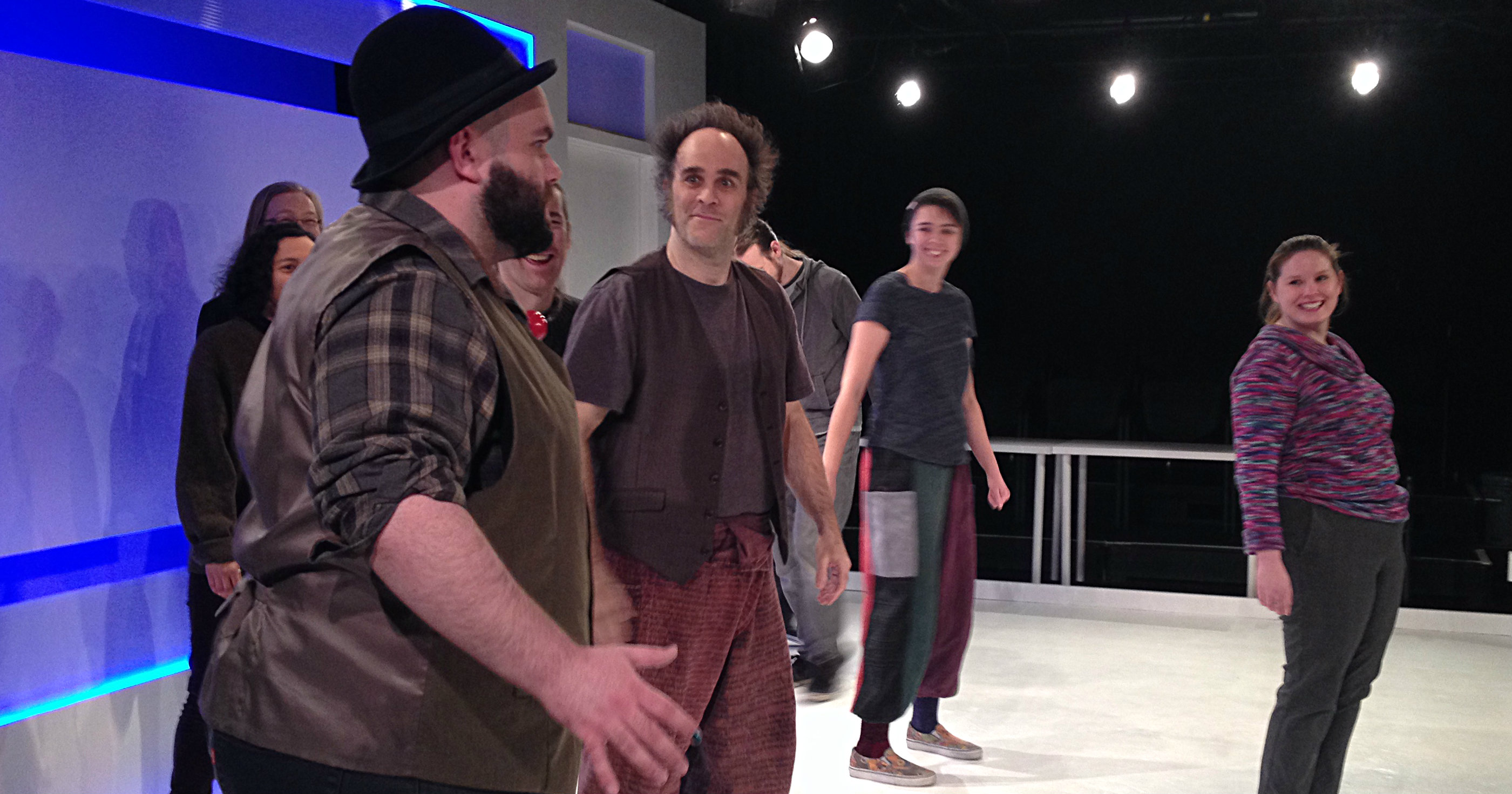
Playing the theater game ‘Mr. Hit’ at the Bath House Cultural Center. L-to-r: Isaac Young (in bowler), Sharek, Melissa Archer and Candace Clayton. Photo: Jerome Weeks
But just so you’re duly impressed, here’s a quick rundown of Sharek’s accomplishments: He’s a founding member of the clown troupe, the Circus Freaks. They started in a Richardson hookah bar in 2011 as a juggling club. For five years, he directed the Open Stage theater in Richardson and then Plano. So Sharek learned how to establish a business and manage a theater where locals could perform alongside touring professionals in comedy-variety shows. It was, he says happily, “a place to fail.”
But managing the Open Stage also meant he had to perform as emcee — and talk on stage.
“You know, I didn’t start by calling myself a clown,” Sharek says in a taped show from October 2014. “Actually, a guy who’s much more classically trained called me a clown for the first time, and I said, ‘That’s probably a good warning label.’
So I wore it.”
A small chuckle from the crowd.
“Thank you for that courtesy laugh,” Sharek says.
Pause.
“It meant a lot.”
A bigger laugh.
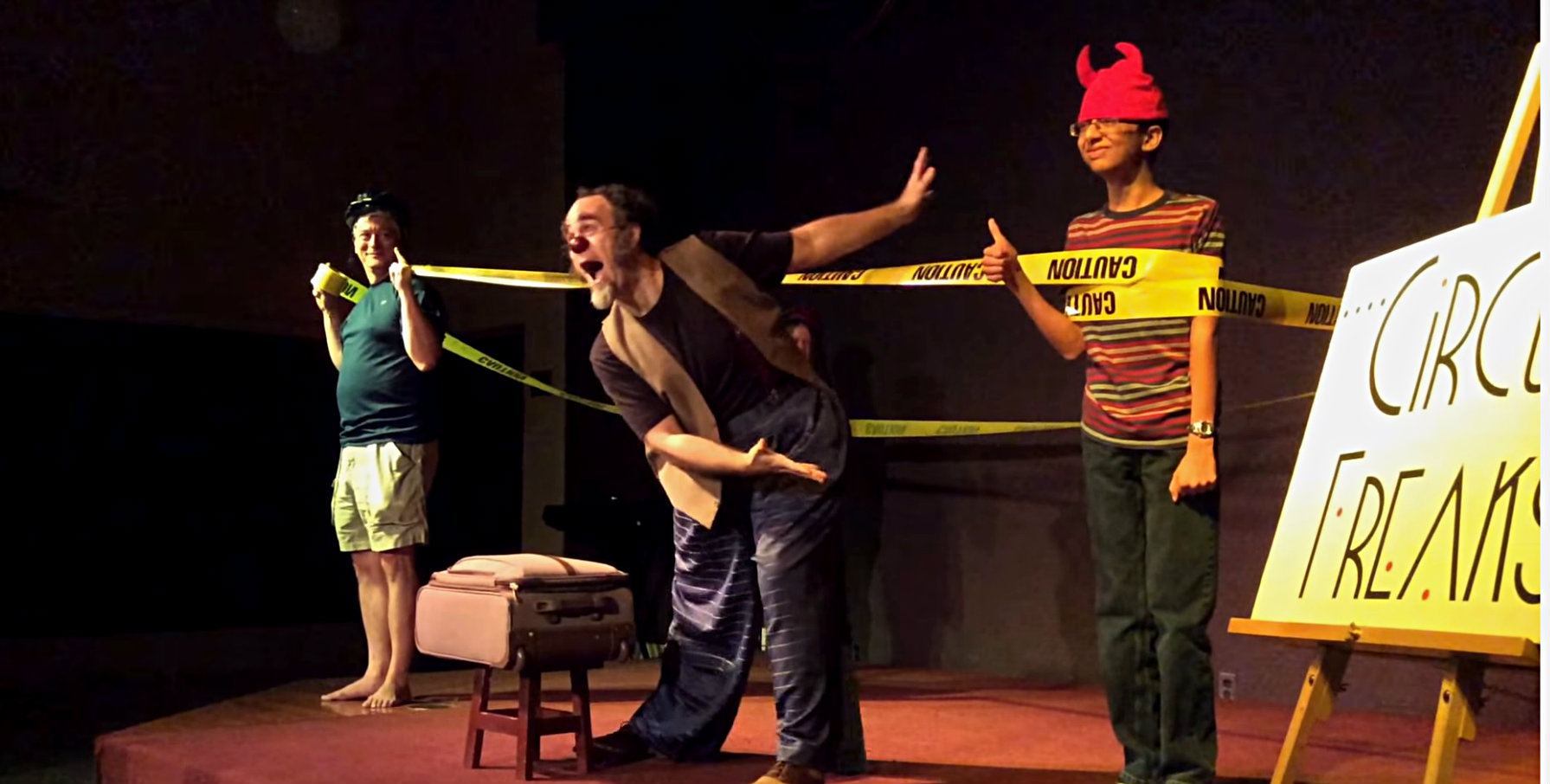
Labyrinth Walk Coffee House Vaudeville Night — with audience members.
Sharek’s real start was as a jeweler. His family moved to North Texas in 1988 when he was 16. In a few years, he quickly found college didn’t suit him, so he dropped out and apprenticed in a Dallas jeweler’s studio. And it all went very well – until his early 30s. That’s when he hit a personal crisis: Why was he even making this stuff?
“I was sitting around a lot,” he says, “avoiding work, avoiding the studio. And a friend of mine came by. He’s a sketch comedy guy. And he’s got a crystal ball he’s trying to juggle.”
The friend didn’t know the right moves yet, but somehow, Sharek instinctively knew how it should work.
“And somewhere my brain said, ‘Huh, I could learn this.”
So he did. Sharek spent years learning juggling. Stilt-walking. Slapstick. Pie-throwing. Timing. He says he learned some of this from the New York Goofs, the troupe in Denton that specializes in ‘bouffon’ (French clowning designed to mock) and “medical clowning” (humor as therapy). In 2011, soon after his fellow jugglers, the Circus Freaks, did their first paid show (for a friend’s baby shower — “it didn’t go well,” Sharek adds, unnecessarily), he turned pro. He became a working clown. Today, the 44-year-old Sharek performs, runs workshops, develops plays. He entertains kids in hospitals and clinics.
So what did his parents think of their son, The Clown?
“Oooooh,” he says. “OK, so I work with kids who’re troubled because I was a troubled kid. So there’s a lot of distance between me and my past. And that is good.”
Right. Just how troubled was that past?
“What particular dark seed is in your profile?” he responds. “For me, it’s self-destruction, y’know? I’m clean and sober now, but I wasn’t always. And when I started this circus journey, I weighed 350 pounds. [Sharek is five-foot, nine inches tall.] And I have all of the baggage that goes along with that.”
He was fat-shamed?
“No, I just never felt normal. Didn’t fit into organized education. I was full of rage. My teachers have all called me on it. I was the fat loser.”
Sharek’s father died when he was in his teens. And Sharek’s family had arguments so spectacular, he says, he, his brother, sister and mother all decided it’d be better to call it quits and keep their distance.
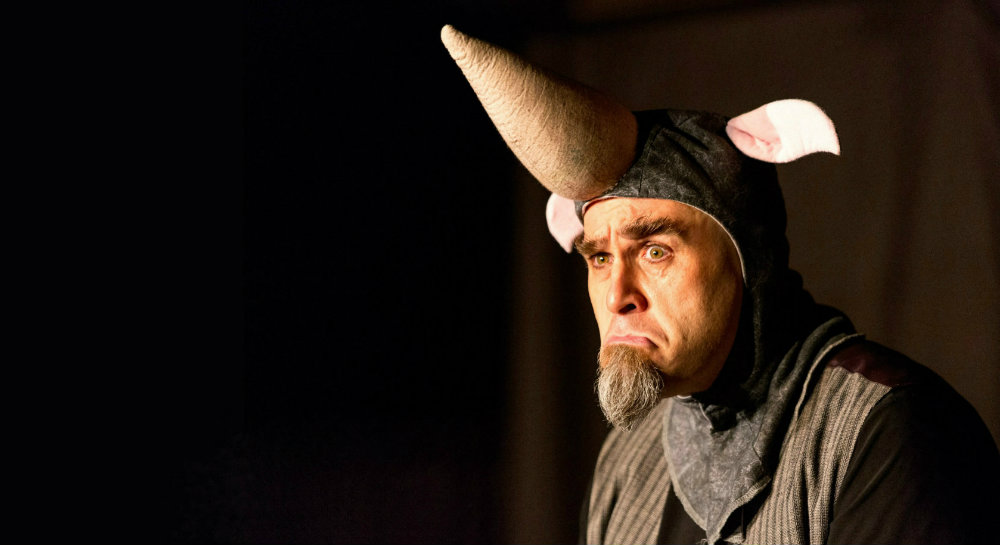
Russ Sharek in the play, ‘La Belle et La Bete.’ Photo: Ed Steele
“However,” he adds, “my mother recently came to one of my shows.”
First time?
“First time.”
Recently as in …?
“Recently, over the summer. We had not spoken in a very long time.”
In the course of that show, Sharek went into the seats and clowned around with theatergoers. Then he hugged his mother. And introduced her to the crowd.
“And she said, ‘I’m so proud of you.’ And I said, ‘I turned out exactly like she expected!’ And every one died. And inside, I felt so much better. And after the show, we had a very nice moment. Perhaps a long time coming. A bit of healing. Just a moment.
And then — back to work.”
Studying to be a clown, accepting it as a serious discipline, being as simple and open and as honest as he can on stage: This is the European tradition of clowning. And it’s changed Sharek. American clowns generally derive from the circus. Circus clowns play in big-top arenas where they have to be loud and exaggerated, and that’s where many of us first encounter them. Or we encounter them at birthday parties where, as kids, we wonder, what is this creature? He’s big like a parent but acts like a demented kid. Clowns have always crossed boundaries, violated people’s space.
Which is why they can be unsettling. They don’t fit in. They’re outcasts who don’t seem to mind being outcasts. They thrive on being seen as idiots. No wonder clowns were often part of the old freak shows. In America, tell people you’re a clown and we’re likely to think of Pennywise, the killer clown from Stephen King’s horror story, ‘It.’ Or we think of the delightfully craven and self-indulgent Krusty the Klown from ‘The Simpsons” (“Hey, hey! Wasn’t that great, kids?”). It’s no coincidence that Krusty and Pennywise are both associated with children, and both function as resentful, needy, unleashed ids.
European clowns are different. They play smaller venues like cabarets. They’re admired for their control, their precision, the way they play with artistic traditions (although sometimes, those traditions are mocking, vulgar, outrageous and dark).
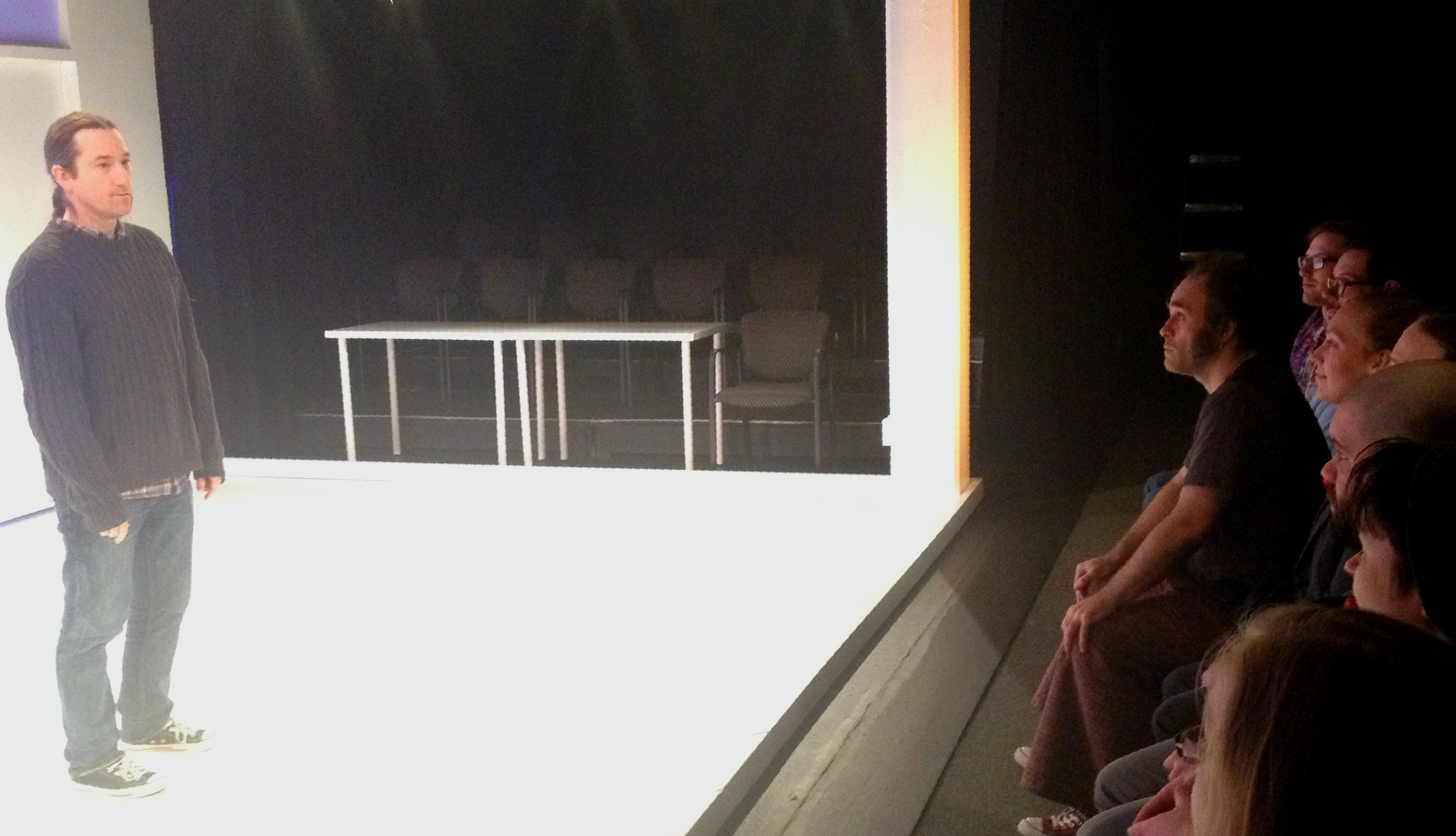
Don’t do something, just stand there. Russ Sharek and the rest of the workshop class watch Jerynn Barbary. Photo: Jerome Weeks
“Clown in this country is a four-letter word,” says Sharek. “Overseas, it’s respected to the point of being jaw-droppingly impressive.”
After Open Stage closed shop in Plano in 2015 (the landlord had other plans for the space), Sharek took the opportunity to study with several European masters and European-trained ones, such as Avner the Eccentric in Maine, Spymonkey Theatre Company in Brighton, England, and the Brazilian clown Angela de Castro, who’s based in London and whose training show, ‘How to Be a
Stupid’ has toured worldwide.
Fifteen minutes into his performance for de Castro’s London workshop, Sharek says, she screamed, “STOP ACTING!”
The clown is not a stage actor, shaping a different character, playing someone else. A clown is always just himself. Or herself.
“She busted me” says Sharek, “and then she took all the pieces and cleaned them off and re-assembled them, teaching me to include myself in this work and accept the magical thinking of this work. I have friends who will tell you, I came home different. Even doing work I did previously, it’s different. It comes from a place of joy, a place of wonder.”
These days, Sharek is more of a wise fool — a “worthy fool,” as Touchstone is described in ‘As You Like It.’ He may bellow at a student when he disappoints, but then he’ll turn around and tell him how much he and the rest of the audience loves this little bit of humanity he actually, almost accidentally revealed.
Remember, Sharek recalls the Open Stage fondly as “a place to fail.” It was also a place to play.
“A lot of the workshops we do now are about play,” he says. “If you don’t have that, something in you withers. There’s this muscle you have to have to function in this world, and without it, you can’t lighten up. And that can take you to some very dire places. I have been there. I know.”
These days, Sharek conducts some of his workshops in a converted warehouse in the industrial area near Dallas’ Medical Center. The place is owned by Christine Hale, who has her own aerialist company, SOAR Creative. Aerialist refers to tightrope walking, trapeze work, silk-rope dancing. And Hale is transforming the space, hoping to open it this summer as a multi-purpose performance venue with that Cirque du Soleil-ish mix of aerialists, jugglers, acrobats —
And Sharek will help manage it and put together the shows.
The fool will have a new home.
Do you have a day job?
I am currently very lucky. I am currently working full-time as a performer. I work as a performer, a teacher and I run a troupe. And so I’ve gotten myself in to a rare place: Performing is my full-time job. {FYI: The Circus Freaks’ first paying gig was a friend’s baby shower.] And I don’t actually know how people doing what I am doing are able to manage another job. I am so impressed when I know someone who is doing what I am doing and has a side hustle — because it’s mind-blowing that they can do this work.
It doesn’t always go this way, but how did juggling lead to clowning?
Eventually, I started working with a juggling partner who was significantly more skilled than I was. And when he would drop something, people would say, ‘The way you pick stuff up and keep going is amazing! We love that you’re a hero that way.’ Whenever I would drop something, people would laugh and I would get very angry. Then they would laugh more.
Finally, someone who knew a lot more than me walked up and asked, ‘Have you considered being a clown?’ I said, ‘Oh no! No. No. No. I’m way too cool for that.’ And honestly, I think that mantra was there for a long time. ‘I’m way to cool for that.’ And finally, people suggested it enough times that I was like, ‘All right already. I’m gonna look into this clown stuff.’
And I believe that it has to be a calling. No one would do the stupid amount of work that it takes to be a clown unless it was right for them.
But it felt right and it was very freeing. And correspondingly, I became a better juggler. And now I can drop things whenever I want. And be funny all the time.
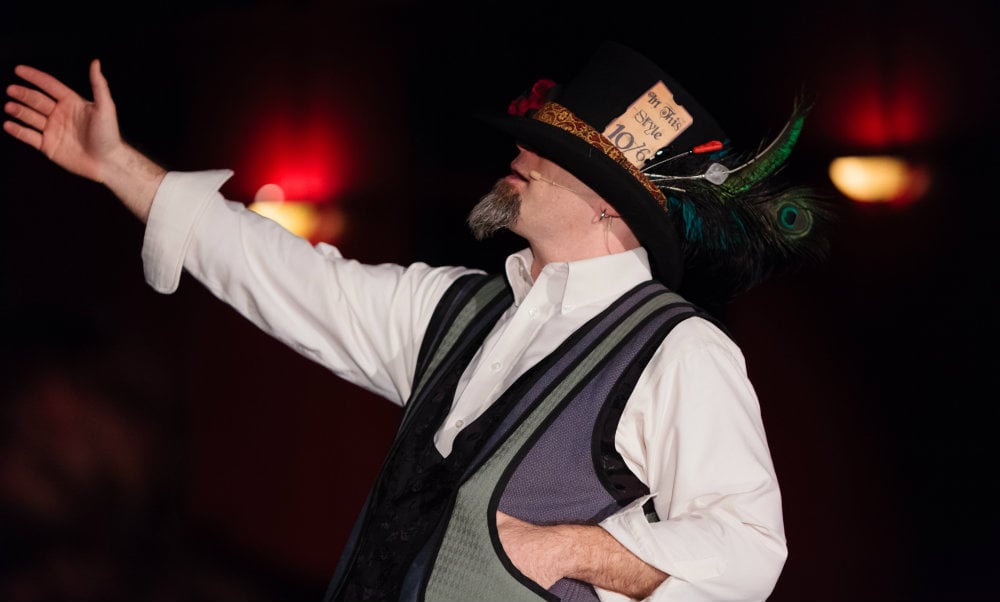
Mad Hatting it. Photo: Matt Vanecek.
How has being in North Texas affected your art?
I think I’ll be a clown in the shower. It doesn’t matter. That much is true.
However, Dallas has a weird, unique thing going for it. This town – and I almost said ‘we’ and I don’t usually say ‘we’ – wants to enjoy and understand things, we want to become cosmopolitan, but in many ways, this is still a small and growing town/city. And we’ve just gotten to a place where we’ve got theater big enough to have ‘circus.’ Not circus in the big-top way, but theatrical circus.
And I think we’ just beginning to ask, ‘What’s this whole clown thing about?’ We don’t really know! So I think there’s a neat opportunity to bring the clown. And not everyone knows what to do with it. We’re close enough to Mexico that we have a great respect within the Hispanic community. You know when payaso [the clown or buffoon] comes, it’s a big day. But that also comes with its own culture and its own type of storytelling.
Here, I think clowning may be less respected than ‘proper theater.’ And I would like to punch a dent into that without having to go and do ‘proper theater.’ I think theater is amazing, but I think it would bore me to death to do just that.
But you’ve certainly done plays. You’ve been in the theater festival at the Bath House Cultural Center.
Yes, we’ve done ‘Playthings’ and “This Show” and we threw together a Christmas show last month called ‘No Tinsel Required’ at the Margo Jones. They asked, do you have a Christmas show, could you do one? We said, sure! We really had no idea. But we threw it together in four weeks.
Are you working on a new show now?
I’d like to do “This Show” again.
Which show?
“This Show” at the Margo Jones. We were so clever. It turned out to be a terrible title. Everyone asks, what show? And we have to say, you know, THIS SHOW — the one at the Margo Jones.
Interview questions and answers have been edited for clarity and brevity. The cartoon ‘selfie’ above is by Isaac Young.










